Tunisie : les prémisses d’une nouvelle révolution ?
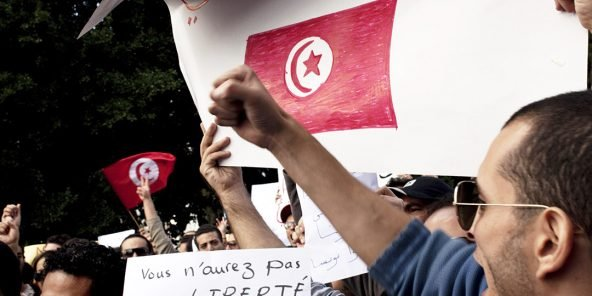
Près de dix ans après la chute de Ben Ali, le pouvoir est confronté à une colère qui monte, et dont les motifs sont aussi variés que nombreux. Plusieurs manifestations sont prévues le 17 décembre.

Près de dix ans après la chute de Ben Ali, le pouvoir est confronté à une colère qui monte, et dont les motifs sont aussi variés que nombreux. Plusieurs manifestations sont prévues le 17 décembre.
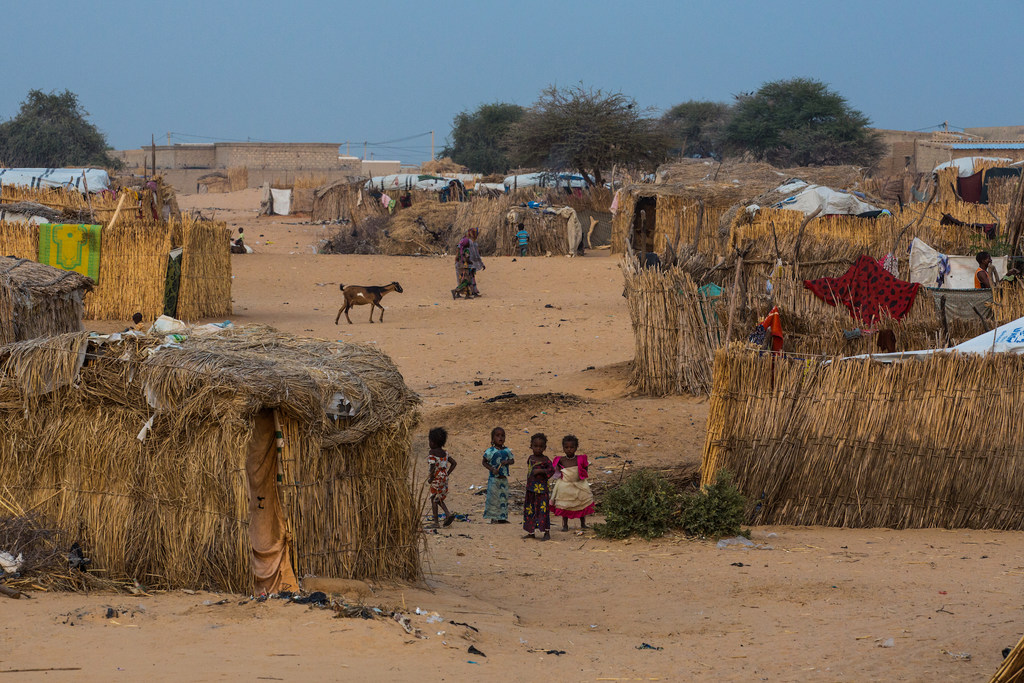
Le chef de l’ONU et l’Agence des Nations Unies pour les réfugiés (HCR) ont condamné l’attaque perpétrée par des assaillants armés à Toumour, une localité du sud-est du Niger, qui a tué 28 personnes et en a blessé des centaines d’autres.
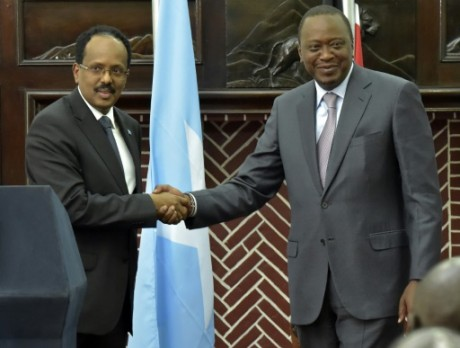
La Somalie a rompu mardi ses relations diplomatiques avec le Kenya, qu’elle accuse d’ingérence, après des mois de tensions croissantes entre les deux voisins d’Afrique de l’Est et alors que Mogadiscio se prépare à des élections pour désigner ses députés et son président.
In Egypt, protests gathered momentum, and the army pulled its forces from the protests and Mubarak stepped down – to be tried in August on charges of abusing power and killing demonstrators.
Tunisia’s revolution after a fruit seller killed himself a decade ago inspired a wave of revolt in Arab countries as people rose up to demand democracy. This is what happened in each of the main uprisings.
Former President Omar al-Bashir was toppled in April 2019 and Sudan is in transition under a military-civilian ruling council and a government of technocrats.
The US decision to end Sudan’s designation as a state sponsor of terrorism comes into effect on Monday. The listing, in place for almost three decades, restricted Khartoum’s economic links and cut it off from much-needed financial assistance.
Sudan has had the designation since 1993, on the grounds that ousted President Omar al-Bashir was harboring militant groups. It has cut Sudan off from financial assistance and investment.
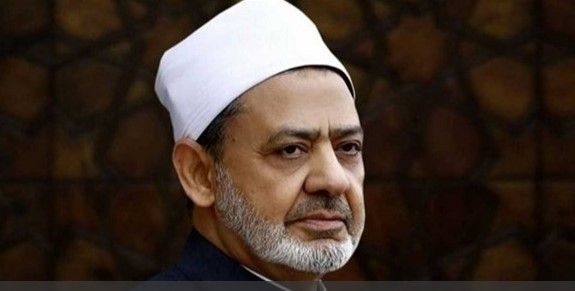
Reactions in the Muslim world to the recent publication of the cartoons of the Prophet Muhammad in the French magazine Charlie Hebdo were very harsh, and included pointed criticism of France and its president Emmanuel Macron. The cartoons were denounced as an insult to the Prophet’s honor and to the sentiments of Muslims that is not legitimate, including as part of France’s commitment to the values of secularism, liberalism and freedom of speech.
Not even the beheading of the French teacher Samuel Paty by a Muslim refugee, after Paty showed the cartoons to his pupils as part of a discussion on freedom of speech quelled the Muslim outrage. The denunciation of the murder was accompanied by criticism of Paty for showing the cartoons to his pupils, and of French authorities for expressing support for the magazine’s freedom of speech.
At first, the protests appeared to be led by the Islamist currents, whose influence in France Macron is trying to curb in his struggle against “Islamic separatism.” Especially prominent were statements by Turkish President Recep Tayyip Erdogan, a patron of the Muslim Brotherhood (MB), who said that Muslims in Europe are facing “a lynch campaign similar to that against Jews in Europe before World War II,” and called Macron an Islamophobe who “needs mental treatment.” Erdogan also called for a boycott of French products.[1] Pakistan Prime Minister Imran Khan also used strong language, accusing Macron of “attacking Islam,”[2] and former Malaysian prime minister Mahathir Mohamad stated, in a tweet subsequently removed by Twitter, that “Muslims have a right to be angry and to kill millions of French people for the massacres of the past.”[3]
Unexpectedly, Ahmad Al-Tayyeb, the Sheikh of Al-Azhar, the most important religious establishment in Egypt and the entire Sunni world, joined in the criticism, but made conflicting statements. Despite denouncing Paty’s murder, he explicitly encouraged martyrdom for the sake of the Prophet Muhammad, at an October 27, 2020 event marking the Prophet’s birthday – thus implicitly justifying terrorism in response to the cartoon crisis. He called love for the Prophet the “personal duty” of every Muslim and said that Muslims must sacrifice their souls, their family, and all that is precious to them in order to defend him. He also quoted Quran 9:24, which states that the Muslims’ love for Allah, Muhammad, and jihad must be greater than their love for their family and possessions.
Al-Tayyeb’s statements seem to be aimed at bolstering his status and the status of Al-Azhar as leaders of the campaign against the Charlie Hebdo’s publication of the Muhammad cartoons. At the same time, such statements coming from the Sheikh of Al-Azhar – who stood by Egyptian President Al-Sisi at a crucial time in 2013, when the latter deposed the MB administration headed by Muhammad Morsi – can seriously undermine his and Al-Azhar’s standing with the Al-Sisi regime. This is because these statements, in essence, support Al-Sisi’s bitter rivals, namely the MB and its patron, Turkish President Erdogan, as well as Qatar, who support and finance terror organizations and extremist Islamic elements in the Muslim world and the West.
In the long run, Al-Tayyeb’s extremist position can also harm his and Al-Azhar’s standing with the international community, since it belies the view of Al-Tayyeb and Al-Azhar as champions of moderate Islam who combat extremism and violence and can help the French authorities appease the Muslim public and resolve the cartoon crisis.
It should be noted that Al-Tayyeb’s uncompromising message – that insulting the Prophet Muhammad is taboo and that any criticism of him constitutes an offense to Muslims – is in line with his refusal to foster any profound changes in Islamic thought and to promote reform in religious discourse. These are steps that the Al-Sisi regime is promoting as part of its fight against extremism and terror in the country. Al-Tayyeb’s conservative stance is also in line with his past extremist statements in praise of terror and against non-Muslims. He has claimed, for example, that there is no proof that Osama bin Laden was responsible for the September 11, 2001 attacks,[4] that fundamentalist terrorist groups are the product of imperialist forces in the service of global Zionism,[5] that suicide attacks by Palestinians against Israeli targets are legitimate because the Palestinians are entitled “to blow up whatever they want,”[6] that Christians are infidels,[7] and that a non-Muslim cannot serve as head of a Muslim country. [8]
This report will review Al-Tayyeb’s positions on the Muhammad cartoons recently republished by Charlie Hebdo, as well as his long-time conservative stance on reforming the religious discourse and extremist statements he has made over the years.
Al-Tayyeb: We Must Defend The Prophet With Our Lives; Our Love For Allah, Muhammad And Jihad Must Be Greater Than Love For Our Families And Property
Al-Tayyeb, who condemned the recent terror attacks in France on several occasions, said at the annual celebration of the Prophet’s birthday on October 27, 2020 that love for the Prophet was a “personal duty” of every Muslim and that Muslims must sacrifice their souls, their family and all that is precious to them in order to defend him. Quoting Quran 9:24, which states that the Muslims’ love for Allah, Muhammad and for the waging of jihad must be greater than their love for their family and possessions, he added that insults to the Prophet were acts of politically-motivated hostility towards Muslims, and expressed surprise that they occurred in countries that purport to be the “cradle of civilization” and to defend human rights.
In this speech, Al-Tayyeb condemned the murder of the French teacher Samuel Paty and called on Europe’s Muslims to integrate positively in their countries. But his radical statements about loving the Prophet and loving jihad seem to empty these condemnations of meaning and may be regarded by many Muslims as direct encouragement to martyr themselves for the Prophet’s sake and as justification of the terror attacks carried out in retaliation for the publication of the cartoons. Al-Tayyeb said: “We Muslims do not doubt for a moment that Islam, the Quran and Muhammad are divine lights that illuminate the earth and the path for mankind, which is seeking happiness in this world and in the world to come, and that these three lights are protected by Allah, by His will and by His promise. We also have no doubt that those who attack them – regardless of their race, faith and beliefs – will be defeated. How can we possibly feel fear when Allah tells us [in Quran 9:32], ‘They wish to extinguish Allah’s light with their mouths, but Allah will only allow His light to be perfected, even to the dismay of the disbelievers’?…
“It is thanks to [the Prophet Muhammad] that nations and peoples were saved and the warped and crooked ways of societies were mended. We believers must revive the feelings of love for and loyalty to the Prophet and defend him [by sacrificing] our souls, our family members, our children and anything that is precious to us. Know that love for Muhammad is a personal duty incumbent upon all Muslims. The Quran [9:24] enjoined us to [love him] by saying, ‘If your parents and children and siblings and spouses and extended family and the wealth you have acquired and the trade you fear will decline and the homes you cherish – if all these are more beloved to you than Allah and His Messenger and than waging jihad in His Way, then wait until Allah brings about His Will. Allah does not guide the sinful.’ Whoever loves his son, his family or his money more than Allah and His Messenger must expect something [bad] to happen to him sooner or later. Moreover, he is numbered among the sinful. This is supported by Muhammad’s words [in a hadith], ‘None of you is counted among the believers until he loves me more than his son, his father and all of mankind.’ This does not mean love in the emotional or sensual sense, which is a feeling that one cannot control or direct, such as the love for some person, for one’s child or for one’s money. That [kind of] love is not chosen and is beyond one’s ability [to control]. What is required of the believers according to this hadith is cerebral love, out of personal choice, which arises from learning, study and the drawing of inferences, like one’s love of heroes, role models with lofty values, and others who exhibit the highest degree of human perfection.
“The Muslim world and its religious institutions, headed by Al-Azhar, were quick to condemn the heinous murder of the French teacher in Paris. This [murder is indeed] a saddening and painful event, but it is also very saddening and painful to see the insults to Islam and the Muslims in today’s world. This has become a means of attracting electoral votes. The [publication of] cartoons that insult our great Prophet, endorsed by some newspapers and magazines and by some political agendas, is a wild and wanton act of [spreading] rubbish that breaches every boundary of responsibility and decency, as well as the accepted international norms and laws. This is open hostility to this monotheistic faith and to its Prophet, who was sent by Allah as grace to the entire world.
“We at Al-Azhar, and all countries of the Muslim world, harshly condemn these rude [insults] that do not hurt the Muslims and their Prophet as much as they hurt those who are ignorant of the greatness of the honorable Prophet Muhammad. We call on the international community to draft international laws that criminalize hostility towards Muslims and discrimination [against them] in terms of rights, duties and mutual respect. We also call on the Muslim citizens of Western countries to integrate positively and consciously in these societies and in every framework that preserves their religious and cultural identity and prevents [people] from being swept by the provocations of the far right, by despicable racism and by the polarization [promoted by] the groups of political Islam. The Muslim citizens [of these countries] must confine themselves to peaceful, rational and legal measures in opposing the discourse of hate and in attaining their legitimate rights, taking an example from the virtues of their noble Prophet.
“I am very surprised that these flames of fitna [strife], hate and insult have flared in countries that always boasted that they are the cradle of civilization, culture, enlightenment, science, progressiveness and human rights. Their norms have become very confused, to the extent that they hold up the lamp of liberty and human rights in one hand, and the call for hate and conflagration in the other…”[9]
Al-Tayyeb also made firm statements in his meeting with French Foreign Minister Jean-Yves Le Drian during the latter’s recent visit to Egypt, which was perceived in the Egyptian media as an attempt to clarify Macron’s position on Islam and the Muslims and enlist the help of Egypt’s leaders and of Al-Azhar in appeasing the Muslims and resolving the crisis. Whereas Le Drian’s meetings with Egyptian President ‘Abd Al-Fattah Al-Sisi and Foreign Minister Sameh Shoukry were characterized by the standard diplomatic courtesy, Al-Tayyeb clarified at the very beginning of his meeting with Le Drian that he did not plan to “use diplomatic language when Islam and the Prophet Muhammad are at stake.”[10] He stated firmly that Islam has nothing to do with terrorism, and that the Prophet’s reputation and image are sacrosanct, so that disparaging them is deeply offensive to Muslims and should in fact be criminalized. He added that Europe is beholden to Muhammad and to Islam for the light they brought to humanity and that it is not wise to provoke the feelings of millions of Muslims. “We will sue those who offend our noble Prophet in international courts, even if we have to devote our whole lives to this,” he said.[11]
Al-Azhar’s Council of Muslim Elders, headed by Al-Tayyeb, announced that it had decided to file a lawsuit against Charlie Hebdo,[12] and Al-Azhar called for international laws criminalizing the act of offending religions and their sacred symbols.[13]
By Echoing The Position Of The MB And Its Patron Erdogan, Al-Tayyeb Risks Compromising Al-Azhar’s Status With The Al-Sisi Regime
In essence, these extremist statements by Al-Tayyeb lend support to President Al-Sisi’s bitter enemies, the MB and its patron Erdogan, who, along with Qatar, aid and finance terror organizations and extremist Islamic elements in the Muslim world. It should be recalled that Al-Tayyeb stood by Al-Sisi in 2013 when the latter deposed the MB administration headed by Muhammad Morsi.[14] His support for the Al-Sisi regime, and the suppression of the MB inside and outside Egypt – a movement that challenges the status of Al-Azhar in the Islamic world and strives to dominate the religious discourse – has enabled Al-Azhar to gain strength in Egypt and the rest of the Muslim world. In the long run, Al-Tayyeb’s rigid stance, which lends support to Al-Sisi’s extremist rivals, can therefore boomerang on him by compromising the status of the very institution he heads. It should be noted that other Islamic institutions, such as the Muslim World League in Saudi Arabia, strove to avoid a religious clash during the recent cartoon crisis by tempering their statements. They limited themselves to condemning the publication of the cartoons, rejecting any connection between terror and Islam, and stressing that Islam forbids responding to one crime by committing another.[15]
In addition to compromising Al-Azhar’s status in the Islamic world, Al-Tayyeb’s statements can also damage its standing in the international arena. Al-Tayyeb has frequently stressed that Al-Azhar under his leadership “promotes a message of moderation,”[16] and in recent years he has even participated in interfaith dialogue. However, no one who calls for martyrdom in defense of the Prophet Muhammad, and who quotes verses stating that Muslims must love jihad more than they love their families can be considered to be promoting moderate Islam or seeking to eradicate extremism and violence. Although France once relied on messages by the Sheikh of Al-Azhar in its efforts to preserve its secular character, and even received support from Al-Tayyeb’s predecessor, Muhammad Sayyed Tantawi, for the national ban on the hijab in state schools, it is not likely to receive such support from the current head of Al-Azhar.[17]
Al-Tayyeb Opposes Moderate Re-Reading Of The Sunna (Traditions About The Prophet’s Life) As Part Of The Fight Against Extremism
Al-Tayyeb’s uncompromising message – that insulting the Prophet is taboo and that any criticism of him constitutes an offense to Muslims – is in line with his refusal to promote a reform of the religious discourse, including the call to adopt a moderate reading of the Sunna, the corpus of traditions about the deeds and sayings of the Prophet Muhammad, or to advance an approach that is more compatible with the modern age. Since Islam, he contends, is completely innocent of any call for violence or terrorism, there is no need to reinterpret its sources in support of fighting them.
Since he took office, Egyptian President Al-Sisi has been trying to enlist the help of Egyptian clerics, particularly the Sheikh of Al-Azhar, in promoting a “religious revolution” to combat the extremism pervading the country. He aims to accomplish this by renewing the religious discourse and endorsing an enlightened and modern reading of the Quran and the Sunna.[18] However, Al-Tayyeb, and Al-Azhar under his leadership, have stubbornly refused to cooperate with this initiative of the regime.
Al-Tayyeb has, for instance, opposed an initiative by Egypt’s minister of Islamic endowments, Mohamed Mokhtar Gom’a, an Al-Sisi loyalist, to adopt a modern reading of the Sunna and discard traditional literal interpretations. Gom’a explained his position in a June 29, 2018 article in the state daily Al-Ahram: “There are those who stop at the literal [interpretation] of the [religious] texts and do not go beyond their literal meaning in understanding their intent and aims… Had we understood [these texts], and presented them to people in a better way, we would have changed the negative image created by the mistaken interpretation and understanding applied to them by the extremist terrorist organizations, and also [changed] the perceptions of those who hold these misunderstandings and fixed views.”[19]
Al-Tayyeb, for his part, expressed vehement objections to this call for reinterpreting the Sunna, calling it “three-fourths of the religion” and framing it an attempt to cut back or eliminate its status in Islamic jurisprudence. He called this a “deviation from the straight path” that had been advocated in India by “those close to the colonialist apparatuses” and was now being promoted in Egypt.[20]
He also forcefully rejected another initiative for reinterpreting the Islamic traditions, including the Sunna, proposed by the Cairo University president Prof. Muhammad ‘Othman Al-Khosht, who argued that the religious sciences had stagnated because of duplication and copying and a lack of critical or scientific analysis. He added: “We still live in the times of the fitna [internal strife] of the Caliph ‘Othman [ibn ‘Affan].[21] The same old battles are present today. All the battles of ISIS are identical to the battles at the advent [of Islam], because we have been unable to enter a new era.”[22] Al-Tayyeb argued that Al-Khosht’s initiative was aimed not at renewing the religious heritage but at abandoning and disregarding it, saying: “The [Islamic] heritage that is being derided today… [is what] took a group of Arab tribes that would fight each other and didn’t know right from left, and, over the course of 80 years, enabled them to set one foot in Al-Andalus and another in China.” Rejecting any connection between Islam and terrorism, Al-Tayyeb said, addressing Al-Khosht: “You must be from a village. Go ask any villager behind his plow if what ISIS is doing is a part of Islam. He will surely tell you that it is not. We, Al-Azhar’s scholars and clerics, have said this more than once, and have held one, two, or 10 conferences. We have said that Islam and the Muslims are innocent of this terrorism. Even so, we’ve had to face constant accusations about the terrorist nature of Islam, and we’ve had to hold conferences to say that terrorism is not a part of Islam. There is an accursed and vicious [propaganda] machine that directs the way people think [about Islam].”[23]
Egyptian President Al-Sisi: Even The Prophet’s Sira Is Not Free Of Extremism
Al-Tayyeb’s refusal to promote the Al-Sisi regime’s initiatives for renewing the religious discourse has sparked considerable tension between the two figures. The annual celebration of the Prophet’s birthday, which is held by Egypt’s Ministry of Religious Endowments and attended by the president and the head of Al-Azhar, has in recent years served as a platform for discussing the Prophet’s legacy and presenting initiatives for reinterpreting this legacy, such as the abovementioned initiatives by Gom’a and Al-Khosht. Al-Sisi, who has given up any hope of enlisting Al-Tayyeb’s help in promoting these initiatives, has also used this forum for harshly criticizing him and Al-Azhar for rejecting the initiatives and not doing enough to eradicate extremism in Egypt.
However, this year, in light of the Muhammad cartoon crisis and the enraged protests throughout the Muslim world, Al-Sisi apparently tried to temper his criticism of Al-Azhar and his calls for reform. He settled for quipping that “even the sira [biography] of the Prophet Muhammad is not innocent of extremism,” and with a call to redouble efforts to eradicate extremism in the country. Attempting to convey a moderate message and stressing the values of tolerance and coexistence in Islam, he also condemned the publication of the Muhammad cartoons, saying that liberties like freedom of religion, thought, and choice must not be unlimited, for when they are, people’s whims can lead to anarchy that permits destruction and ruin. [24] Also, at a December 7, 2020 press conference with French President Macron, he said that religious values transcend humane values.[25]
Al-Tayyeb’s Al-Azhar Refuses To Declare Terrorists As Heretics
The Egyptian media have also expressed displeasure at the Sheikh of Al-Azhar’s recalcitrant position; in recent years, it has accused Al-Azhar, under Al-Tayyeb, of encouraging extremism instead of helping to fight it. This criticism came to a head when Al-Azhar refused to declare extremist jihadis as heretics – in contrast to other clerics in Egypt and elsewhere who have done so.[26] Al-Azhar’s position is that a Muslim remains a Muslim as long as he has not renounced the shahada, i.e. the declaration that there is no God but Allah and Muhammad is His Messenger, and that only a shari’a judge can convict a Muslim of heresy. The institution also expressed concern that accusing terrorists of heresy could open a Pandora’s box and lead to internal strife in Islam. Al-Tayyeb explained to Cairo University students who asked why Al-Azhar was refusing to rule that terrorists were heretics: “If I rule that they [ISIS members] are heretics, I will be like them.”[27]
Al-Azhar’s refusal to issue such a ruling sparked widespread condemnation in the Egyptian state media, which perceived as failure to cooperate in the war against terrorism in Egypt and worldwide. Moreover, Egyptian media claimed that Al-Azhar’s curricula themselves foster extremism and terrorism.[28] Former culture minister Gaber ‘Asfour addressed this issue, condemning Al-Azhar’s “atrophied and backward” education system that produces terrorists. He said: “Al-Azhar, for the most part, aside from a small minority, has become Salafi in its attitude. Do not believe that they will do something they don’t believe in. They work against development. How can they renew the religious discourse when they are the ones who caused it to stagnate [in the first place]?…”[29]
Al-Azhar, for its part, rejected the accusations by both the regime and the media that it was encouraging extremism, even stating that its officials were part of the regime’s program for eradicating extremism and working to renew the religious discourse. Al-Tayyeb said that “some media are waging a deliberate campaign against Al-Azhar.”[30]
Al-Tayyeb’s Years-Long Conservative And Extremist Approach Discourages Moderate Religious Discourse
Al-Tayyeb’s conservative stance and his refusal to promote profound ideological reform leading to a moderate religious discourse are part of his approach over the years, as reflected by extremist statements he has made on many issues. Al-Tayyeb has claimed, for example, that there is no proof that Osama bin Laden was responsible for the September 11, 2001 attacks, and hinted that Israelis may have been involved in them.[31] He added that Muslims initially condemned the attacks, but that their feelings have changed since then, because the U.S. uses the attacks to do them harm. [32] On other occasions, Al-Tayyeb claimed that fundamentalist terrorist groups are the product of imperialism in the service of global Zionism,[33] and that suicide attacks by Palestinians against Israeli targets are legitimate acts of self-defense, for, as long as Israel, the “barbaric enemy,” continues to attack the Palestinians with the Western and American backing, the Palestinians are entitled “to blow up whatever they want.”[34] In addition, he said that he would be willing to visit Palestine and even become a martyr for its sake.[35] He also stated that the West is Islamophobic, and that this stems from “modern colonialism” and the desire to take over the Muslims’ resources.[36]
Additionally, although he has participated in interfaith dialogue and even held a historic meeting with Pope Francis in May 2016, on earlier occasions Al-Tayyeb had spoken against such dialogue and called Christians “infidels.”[37] Furthermore, he said that a non-Muslim cannot not serve as the head of a Muslim country, because this contravenes Islam, common sense, and democracy.[38]
In light of these past statements, Al-Tayyeb’s recent statements, about the Muslims’ obligation to defend the Prophet with their lives and to prioritize jihad for Allah’s sake over their families, are not surprising, despite the political harm they may cause to the Al-Sisi regime and the danger they may pose to Al-Azhar’s standing. He adheres to a conservative position that rejects any criticism of the Prophet and his legacy. This is the approach that led him to thwart all initiatives to renew the religious discourse in Egypt, which require a reinterpretation of Islamic sources and traditions and especially of the Prophet’s Sunna.
In fact, there seems to be a broad consensus in the Muslim world that freedom of speech does not extend to denigrating religious symbols such as the Prophet Muhammad. Hence, the Sheikh of Al-Azhar, the leading religious institution in the Sunni world, and other establishment clerics in the Muslim world are not likely to show solidarity with France’s efforts to preserve its secular character and its values, including freedom of speech. Such solidarity would be shown only by those who advocate significant reforms to the religious discourse through critical reading and reinterpretation of the Islamic sources, including the Quran and the Sunna – like the reforms proposed by Egyptian Religious Endowments Minister Mohamed Mokhtar Gom’a and Cairo University President Prof. Muhammad ‘Othman Al-Khosht, as part of Al-Sisi’s call for a “religious revolution,” and by a handful of liberal intellectuals in the Muslim world.
A notable statement by Saudi liberal Turki Al-Hamad, an advocate of separation of religion and state, was his tweet following the recent attacks in France: “Before we condemn the cartoons that insulted our honorable Prophet, we must ourselves take a critical look at our heritage, which provided living material for those cartoons. The first [source to look at is] the Sahih Al-Bukhari [compilation of hadith]. A comparison of its content to the Quran reveals that it completely contravenes the Quran.”[39]
Negotiations Run Aground, Threatening Political and Economic Stalemate
A fragile ceasefire signed in October is holding in Libya, and thus far renewed conflict has been averted. But tensions remain high, especially as the year is about to end with no substantial progress in political and economic negotiations that were supposed to pave the way for reunifying a country that has been divided in two, with rival governments and parallel financial and military institutions, since 2014. UN-mediated talks to appoint a unity government are faltering, as delegates have so far failed to agree on how to choose candidates for senior positions. A temporary deal on oil revenues in September enabled the resumption of production and exports and helped de-escalate military tensions in central Libya. But that agreement is unravelling, and new and even more serious financial troubles could ensue. As the window of opportunity for political and economic reconciliation appears to be closing, negotiations risk producing an unstable stalemate that could give rise to a new round of violence.
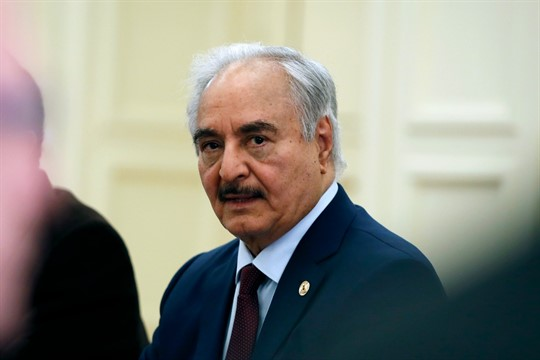
Nearly a decade into Libya’s grinding civil war, it seems next to impossible to imagine stability, let alone a political settlement. The country is as torn as ever between the U.N.-recognized Government of National Accord in Tripoli, which is backed militarily by Turkey, and the rival forces loyal to Gen. Khalifa Haftar’s breakaway Libyan National Army, backed by a motley crew of Russia, the United Arab Emirates, Egypt and France.
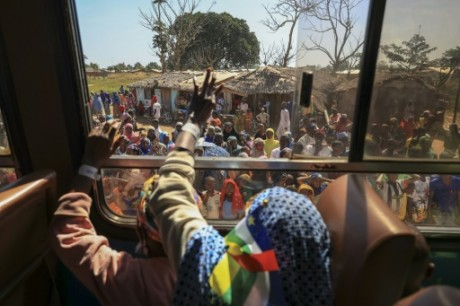
Dans le bus de l’ONU qui le rapatrie, Yacouba Dialo est heureux de rentrer en Centrafrique après six ans réfugié dans un camp au Cameroun, mais il peste de ne pouvoir voter dans trois semaines pour élire le président et les députés de son pays, ravagé par sept années de guerre civile.